#the character arcs starting from opposite places
Note
what inspired you to tell the story of a character like jamis? was he one of the first characters you came up with, and was his character role/creation really tied to remy from the start? you've done a really wonderful job at showing his growth/arc so far, and it seems like jamis and remy grow really in tandem with each other, so I was wondering how you came up with them and their struggles (for example, if you've just always been drawn to those character archetypes or if someone you know/a character you like inspired you) sorry for the long question!! i really love tigers <3 you're such a good storyteller!!!
Jamis and Remy were very tied together from the start! I wrote this whole story with the thought that Ludo/luck and jamis/remy will be sort of different sides of the same coin- jamis and remys arc is... softer? to me, more about the social structures and relationship drama- while Ludo and luck are more explosive and adventurous, creepy and wild.
balancing between the two storylines has helped me so much staying interested in drawing this story for years, every now and then when I grew tired of either one I could always switch to the other. highly recommended trick for other webcomic makers with adhd lmao!!
anyway about jamis; I needed one character that was a counter balance for all the secrecy and plotting in remys life- he lives in the world of traders where he has to navigate a sea of lies and schemes, and jamis is the complete opposite of that world- even to a fault maybe! he always speaks his mind, and he is true to his feelings (even if he might not understand them himself...) summa summarum, I wanted to make a character that's easy to love and easy to forgive, and even if he makes a ton of mistakes, they don't come from a malicious place.
and about remys and jamis love story, I just really wanted to write something that felt kind of doomed from the start (from remys pov at least haha), but then slowly... there builds up a chance, that even if you live in this world where you have to hide your love, there is a possibility for a happy ending. and I wanted it to build up slowly until- well, you'll just have to wait until the end to see what I have planned!!
also, to me remy and Ludo are the duo-main characters of this story, Ludo on the front as the one who makes things happen, and jamis and luck are the supporting characters for their stories. so everything rotates around Ludo and remy!
286 notes
·
View notes
Text
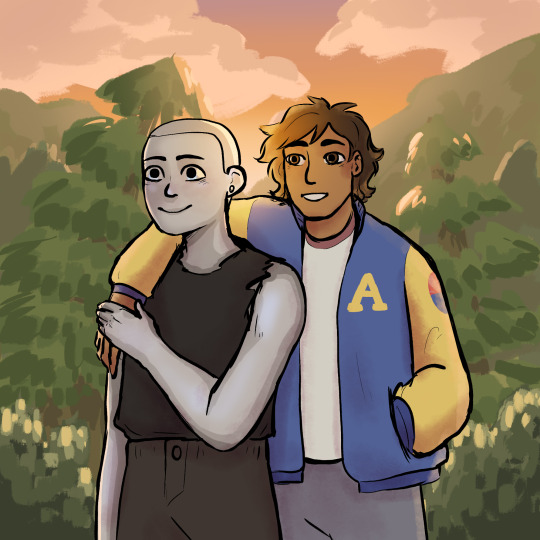
Some Infinity Train fanart because I adore Lake and Jesse with all my heart.
#infinity train#lake infinity train#jesse infinity train#infinity train fanart#fanart#art#the character arcs starting from opposite places#the found family#the murdering#I love them#it izz art
198 notes
·
View notes
Text
Ep 6!!!
#Biggest take away from the episode: @fandom Dazai can't be Atsushi's father figure if he himself says Atsushi's father figure is the–#headmaster check your facts#Second biggest take away from the episode: the worst thing the headmaster transmitted Atsushi ought to be the terrible haircut choices#Mmmmhhh I could spend another whole tag rant to talk about how much I dislike the writing of Lucy in this episode 😭😭😭#But I worry I'll start being perceived as someone who hates women if I do so I won't.#(But let me just say. I really really *really* despite the “what women [alien and mysterious beings] want is hard to understand and–#impossible to decipher and more often than not they will say the exact opposite of what they mean” stereotype.#Like I hate it to an intimate extent.)#I quite like Kyouka's backstory!! I feel like she's the most fleshed out female character with a compelling character arc and personality.#I really like her. Lucy and Atsushi working as make-do parents (very largerly intended. More like siblings who are dating but that sounds–#even worse) was very cute. And I appreciate how the events seemed to set off Atsushi's own reflection on parenthood.#The same doesn't happen in the manga since the chapters are placed in a different order.#Overall this is just an episode that when I was reading the manga for the first time solidified my understanding that me and b/sd have#RADICALLY different views on the world. But now that after three years and having long come to terms with it.#I suppose it's just something that's there.#Ususal notes about the animation just for talks. The lack of budget really shows this episode and in the second half in particular.#It's especially noticeable in backgrounds that are just... Not the stunning backgrounds that usually make b/sd's anime strong point.#So in turn the lack of details comes off as twice as evident as it normally would :/#The whole Atsushi / Tanizaki exchange at the start of the chapter until the headmaster's identity is revealed is completely devoid–#of host which has me just?? What happened here??? A track slowly building up tension is an almost automatic choice I'm just like.#What happened. If it was a deliberate choice it was a very bad one in my humble opinion#On a more positive note I really like whoever drew the characters “background appearence” this episode eheh#(you know‚ the more stylized one when they're not on close up)#And the drawings at the end of the episode daz/atsu twilight scene were good. Kyouka's flashback was also good.#That's it :)#random rambles#Oh yeah rip chapter 39 ss/kk scene ig :///
8 notes
·
View notes
Note
Who do you think the most similar characters to Aegon ii in Asoiaf ?
Oof, tricky, cuz at this point Aegon doesn't really have an arc. Aegon was very much treated as a side character in season 1, considering that we only met him halfway through the series, he's only in four episodes as a not-toddler, and the childhood episodes were more focused on Aemond's character than any of the other kids. A lot of what I and others notice in Aegon's character and potential development comes from being particularly eagle-eyed and from choices that TGC himself is making wrt his acting. It's also tricky because the book this is based on is basically a history book, and historical figures don't traditionally have "arcs" because, they're historical figures, not authorial constructs.
I think, and this is conjecture, that Aegon's arc is likely going to see him go down something of a dark path, as by all counts his "arc" is going to result in what happens after the Flight to Dragonstone, when he technically wins the Dance, and what he does at Dragonstone is pretty dark (it's another one of those scenes where I need the writers to go all out). Aegon's arc could potentially see him abandon vices to focus entirely on the war effort as a way to cope, getting more ruthless and crueler, abandoning this party boy identity he has for a colder one as he suffers not just physical injuries but deeply personal losses (the Dance is going to end with everyone Aegon has ever been close to, ever loved, except for his mother and his daughter, though Jahaera kinda comes with a big asterisk next to her, dead as a result of fighting for his succession) and has to deal with it while at the same time being a reigning king.
Based on that, on that overall through line of "going down a darker road because of the really bad shit you go through" is actually very similar to Tyrion's. I don't think it will be quite the same, as I do think Tyrion is going to eventually pull himself out of the hole he's in, whereas Aegon never entirely manages, but I think it'll be the closest.
#personal#answered#anonymous#it's actually why writing historical fiction can be very hard from a character perspective#cuz you kinda gotta put in character arcs to people who were real and had varied lives#that don't traditionally follow narrative structures#so you've gotta choose what part of the story to tell in order to craft one#it's why if i ever make my augustus biopic miniseries there's a very specific place i want to start and stop at#even tho there was still very interesting parts of his life that happened before and after#and since f&b is a full multi generational history#we know how aegon's story goes from birth to death#very few people in the dance get what we would describe as 'good character arcs' in the book#because in the book they're not characters they're being treated as real people#that doesn't mean the show can't make good character arcs for them#i think we're gonna see a pretty good one for aemond and i do HOPE they do something for aegon#considering that he is a major character he's literally the opposite claimant to the throne
13 notes
·
View notes
Text
I used to really love the first romance scene with Astarion (and I still do) but it hits so much harder after you know why he's doing it. That he's purposefully seducing you for protection and blood, that he's forcing himself to sleep with you, and this is a mask he's wearing.
It's a sexy scene and really feeds into the vampy (pun intended) jump-your-bones version of him you get at the start of the game. The whole thing starts out with him being so confident and suave, saying that he's wanted you ever since he set eyes on you and how you want to be known and tasted. It's like everyone's perfect vampire romance novel.

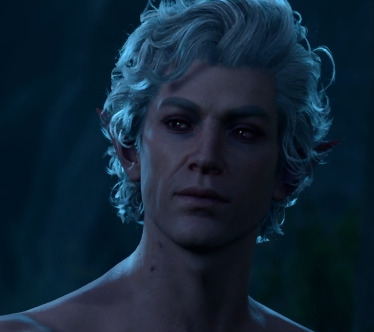
He's laying out the bait that's worked thousands of times over and luring you in. And you can just get right to the kissing if you want.
But, you can also stop and ask him, "And what do you want?"
And for just a moment the mask drops. This is not the same cocky seductive face we've had up until now. This is vulnerability showing. When has anyone asked him what he wants? When has anyone cared? Does he even know the answer to that question?

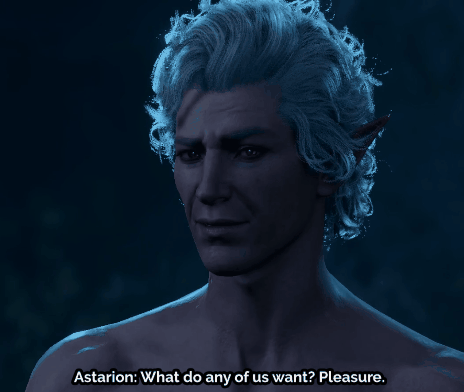
So he pivots. The mask snaps back into place immediately. He turns back into the master seducer and feeds you a line about shared ecstasy to get you back on track.
And then comes what is, to me, the pivotal moment. He asks you "That's what you want, isn't it? To lose yourself in me?"
Looking at his body language he seems unsure at first, maybe questioning his previous tactics. Then he slightly cowers back, lowering himself as he asks the question. The total opposite of his confidence from earlier where he's standing with his arms out wide.
He's not sure what you want anymore. You're not playing by the rules he knows. Why haven't you taken the bait yet? Why haven't you thrown yourself at him?




And when you finally Nod in agreement, confirming you're here for sex?
This. This is the face he gives you. He just looks so damn sad. To me, it hearkens back to "Of course it'll turn me into a monster. What else did I expect?"
Whatever momentary blip made him question why you're there with him, he's just been reassured about both of your roles in this situation.
He sounds so quietly resigned when he answers: "I thought so."
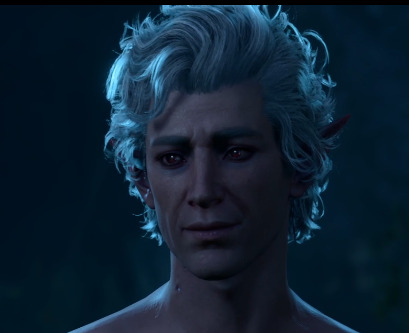
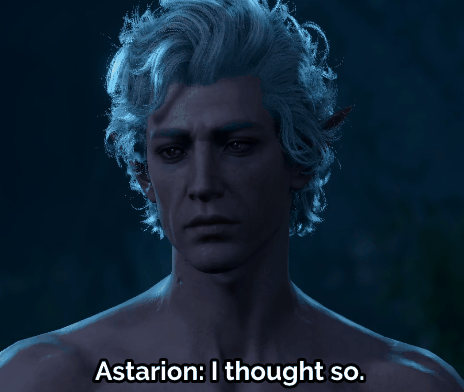
And then the scene transitions into the actual act. I do like to think Astarion enjoyed himself as I'm sure the PC did, but it's hard for me to watch this scene now that I know his story and history without being uncomfortable.
Just that line "lose yourself in me" is so difficult to hear. Because on paper it's so sensual. Who wouldn't want a lover to feel that way about them? But knowing the context of what Astarion expects and believes in this moment is just... oof.
And to me, this is what makes this scene brilliant. The writing, voice acting, and the mocap/animation are all just SO GOOD. It's so delicately done and Astarion the character is so good at playing a role that you can completely gloss over the deeper stuff. But once the mask is eventually stripped away you can't help but see what was there the whole time.
And as we've established, being seen is a whole aspect of Astarion's romance arc.
I originally romanced Astarion for the same reasons I'm sure most did: he's a hot, sexy vampire elf (i.e. everything that's on the surface). But, I keep coming back to him over and over again for the person I know is waiting for me underneath the mask.
#astarion#baldur's gate 3 astarion#astarion spoilers#astarion romance#baldur's gate 3#baulders gate 3 spoilers#bg3
9K notes
·
View notes
Text
Disney doesn't need to change "the formula." That's the last thing that Wish proves.
What Wish proves is that "the formula" only works when you know why the ingredients are in it, and you use them the correct way.
The Princess Character is meant to wish for only half of the movie's message, and go through an adventure that teaches her what the other half is; what her dream was missing. Ariel dreamed of understanding but she was missing love. Tiana dreamed of achieving her goals but she was missing faith. Jasmine dreamed of freedom but she was missing trust. Belle dreamed of adventure but she was missing being understood.
The Villain is meant to highlight the opposite of the movie's message. Jafar gets what he wants through trickery and manipulation; that's the opposite of Aladdin's "truth will set you free" message, and he gets imprisoned in a lamp. Scar thinks being a King is having his way all the time and can't learn from his past of living in Mufasa's shadow; that's the opposite of The Lion King's "Let the past remind you of your responsibility to selflessness." Gaston loves only himself and is always obsessed with appearances; that's the opposite of Beauty & the Beast's "true love is found within a heart of self-sacrifice." That's what makes them such good villains. (and that clear direction is what drives good villain songs, since Magnifico's is what everyone is talking about)
The sidekick is supposed to compare/contrast with the main character's qualities. Abu is a greedy thief, which is what everyone in Agrabah thinks Aladdin is; when he scolds Abu and teaches him selflessness, it shows us who Aladdin actually is. Flounder is easily frightened and looks at the glass half-full; when Ariel coaxes him and leads by example, we see her bravery and positivity reflected in Flounder's tiny character arc. Timon & Pumbaa do whatever they want all day just like young Simba always dreamed of; when Simba goes to live with them, he finds that "getting his way all the time" makes him forget who he really is and feel empty.
The setting is supposed to show off the characters and highlight the movie's message. Rapunzel's tower is designed to be pretty on the inside because of her influence; if it were too dark and prison-shaped, we'd wonder why she didn't work up the courage to leave sooner. Just like how Quasimodo has made his corner of the bell-tower beautiful, too; they're taught the world is cruel and they're not strong enough for it, but they make their own worlds beautiful enough to hint that that's wrong right from the start. Ariel's grotto is shaped like a tower with no roof so that she only has one window to the forbidden Surface, and it's the light that comes from that forbidden world into her dark grotto which literally makes her able to see human things differently. Tiana's apartment has no interesting features except her father's picture, a perfectly made bed, a drawer with no extra outfits but stuffed with tip money, and only two dresses; both of which are for work.
None of that is happening in Wish, because they didn't know why the formula ingredients are there. Disney needs to understand and return to the formula the right way; forgetting it was what got them here.
Asha learns nothing to add to her dream, unless you count "the power to grant wishes is in me." Which you shouldn't, because we didn't even know she was confused about that until the animals sang a song that was completely off-topic and she had the chance to jump in and sing "I'm a Star!"
Magnifico does not demonstrate the opposite of Wish's message effectively because his character has nothing to do with a philosophy against making wishes, and everything to do with power. (He is the strongest character in the film. But because the message and core concept of what wishes are are so bad, that's not saying much.)
Valentino, and Asha's friends, do not highlight anything about her character through compare/contrast. Valentino is brave and all over the place. Her friends are seven-dwarfs parodies. Happy, Doc, Sneezy, Dopey, Bashful, Sleepy, Grumpy. None of that contrasts with Asha's vague characterization of "cares too much." None of it compares to that characterization, either.
The setting is empty. There are no interesting details that teach you something about any of the characters. None in Asha's home, none in the neat-and-tidy one-dimensional forest, none in the Rosas square, and none in the bland, empty castle. Magnifico's study is the closest anything gets; there's a loose concept that all of Asha's friends have to work together to open the roof, and take a leap of faith to weigh the pulley system down. Unfortunately, none of these characters is shown struggling to work together, OR to take leaps of faith, at all, before this point.
The ingredients of the formula are in Wish. They're just not being used correctly. This is how not to use the formula; it's not the formulas fault. If it ain't broke. They should never have let people convince them to try and fix it.
#Disney#critic#wish#wish 2023#wish hate#Disney's wish#Disney criticism#wish Disney#get it together Disney#real Disney#realdisney#notmydisney#Mulan#Tangled#The Little Mermaid#The Lion King#Aladdin#Meta#writing#writing advice#Disney princesses#Princess critiques#the Disney formula#formula#character analysis#animation#set design#Rosas#Magnifico#Asha
3K notes
·
View notes
Text
i do think it's really interesting to compare the ways Star Trek and Doctor Who succeed and fail as pieces of progressive media because they almost have the opposite problem.
both of the shows are progressive, let's make that clear. while there are exceptions, both shows and worlds consistently critique capitalism, value compassion, solve problems without violence, and at least try to be diverse. there will always be individual episodes (and even eras/arcs) that contradict those values but in general, they are progressive compared to your average procedural or whatnot. but they, by the very nature of their premise, often fail to live up to fully realizing those progressive values. and yes, individual instances of racism or misogyny or any type of bigotry is a product of the bigotry of the writers/creators, but Star Trek and Doctor Who ultimately fail and will always fail to fully embody progressivism.
Star Trek is trapped in its own system of the Federation & Starfleet. for any of the shows to work, we the audience have to believe that the Federation is almost always a good & benevolent force and while criticisms of it are made, those criticisms are the exception and not the rule. the Federation/Starfleet can be criticized but at the end of the story, we must reaffirm that our characters are still good people and it's individual corruption that's the problem. the system can be portrayed as flawed but it must always be better than the alternative. if there is a Star Trek show that would truly dig far enough into how the Federation is a product of imperialism and how the nature of exploring & going where no one has gone before is inherently rooted in racism & orientalism then the franchise would collapse because nearly everything to this point relies on the belief in that a fundamentally good utopian system is possible.
now there's Doctor Who. Doctor Who has a quite different premise in that it is never rooted to one place or time the way Star Trek is attached to Starfleet/the Federation. (there could be an argument that Doctor Who is ultimately rooted in Britain but despite the 2005 series and the UNIT era in classic who, there are large swathes of classic who and the EU that never visit Britain. it's been made an important part of the show (as the show is an important part of British culture) but it's not inherent to the basic premise.) however, because Doctor Who is focused on traveling and seeing the wonders of the universe, its premise essentially becomes "some people turn up to fix a problem and then disappear". again, there are exceptions to this (especially in early classic who), but the formula of the show is almost trapped in the belief of individual action and power to solve systemic problems which... is not how most problems or solutions behave in reality. and just as Star Trek can criticize the Federation but must ultimately forgive it, Doctor Who can criticize the Doctor and portray them as flawed but must still reaffirm their status as a hero.
so we have Star Trek too caught up in its own systems to be able to critique them and Doctor Who too focused on running to portray how complex, long term solutions are needed to solve deeply entrenched problems.
and honestly... i don't think either of these are bad. they're simply the limitations of the shows as they exist and it would be far more worthwhile to develop new premises & find other media that incorporate those types of leftist political values from the start than to try to graft them onto 60 year old media franchises and pretend like they've always been there.
and they do serve a purpose! Star Trek might not be able to adequately portray the flaws of a system but it does give you hope for a better utopian future where people are taken care of and allowed to live however they choose, where there's infinite diversity in infinite combinations. Doctor Who might not be able to portray the complicated solutions to complicated problems that we face today but it tells you that every life matters, that kindness is the most important quality, and that everyone can make a difference in some way.
#anyways tdlr: don't substitute fictional stories for political values or something like that#idk. just spinning this in my head#i think a comparison to Star Wars would be interesting too however i'm way too much of a casual viewer to do that#star trek#doctor who#my posts
416 notes
·
View notes
Text
the idea of Stolas publicly humiliating Blitzø in Apology Tour needs, needs, NEEDS to be looked at through the lens of their class difference.
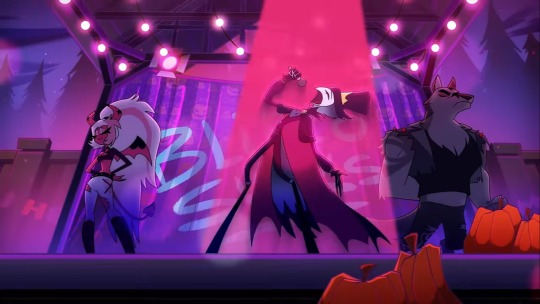
(this is an idea that's been floating around twitter. that stolas is going full diss track in the scene the above screencap is from.
and weirdly enough, there's been some people PRAISING or DEFENDING the idea.
so i did a thread about it on twitter & decided to post it here too bc why not. slightly edited of course bc i made typos in the original lmao.)
first off: i am of the belief that one of the big reasons that Full Moon goes badly is bc stolas is off his meds.
i think that both stolas & blitzø will share some blame for the conversation spiraling out, but i think the main underlying reason that this happens is bc stolas is off his meds & not communicating his point properly.
second: i think that if blitzø DOES cross some sort of line in FM & ends up really hurting stolas, stolas is obviously within his rights to be hurt & feel bad about that shit. and especially bc he's going through his second adolescence & feeling a lot of these intense & big feelings for the first time.
him lashing out in some way or being a little petty could be in somewhat understandable. he's not perfect & has flaws just like everyone else.
HOWEVER. i do not think stolas lashing out after FM or going so far as to PUBLICLY HUMILIATE blitzø is what will happen. doing something like this would kinda be major steps backwards in stolas' character growth.
he has done a lot of work on himself over the 1st half of season 2 but he still has a long ways to go, ESPECIALLY in regards to how he treats imps as a whole.
stolas, a very powerful and influential prince of hell showing up to publicly humiliate blitzø, an imp at the bottom of hell's class system, would be... very questionable at best. and potentially dangerous for blitzø at worst.
regardless of how hurt stolas could potentially be & what big feelings he's experiencing for the first time in his second adolescence, the position & privilege he still currently holds are things that always needs to be considered. especially since a huge part of his character arc is that he's starting to REALIZE the extent of that class divide & how he unintentionally took advantage of that with the Full Moon Deal.
i REALLY do not think that stolas will actually belt out a blitzø diss track. i think that he will be using this opportunity to attempt to communicate properly what he WANTED to say in FM but couldn't bc their conversation spiraled.
but i am still writing this to try to get people to look at this from an alternate perspective.
i love stolas. i relate to him so much & i don't want to make it seem like i don't think he's allowed to be imperfect or hurt by things. i am merely REMINDING anyone that reads this that the class difference between stolas & blitzø currently still plays a large part in A LOT of aspects of their relationship.
publicly humiliating blitzø with the influence he has would NOT be a girlboss moment. it would carry a LOT of weight on how blitzø & his company could be seen & maybe even have an effect on their livelihood.
which is exactly what stolas wanted to AVOID by giving blitzø the crystal in the first place.
he is giving the crystal so that I.M.P can keep going & growing, as well as trying to put blitzø & himself on ever-so-slightly more even footing. this idea of publicly humiliating blitzø would be the exact OPPOSITE of that.
#helluva boss#the full moon#helluva boss full moon#full moon helluva boss#apology tour#helluva boss apology tour#apology tour helluva boss#stolitz#blitzo helluva boss#blitz helluva boss#blitzø#blitzo#helluva boss blitzo#helluva boss blitz#stolas x blitz#stolas#stolas goetia#stolas helluva boss#helluva boss stolas#my shit
432 notes
·
View notes
Text
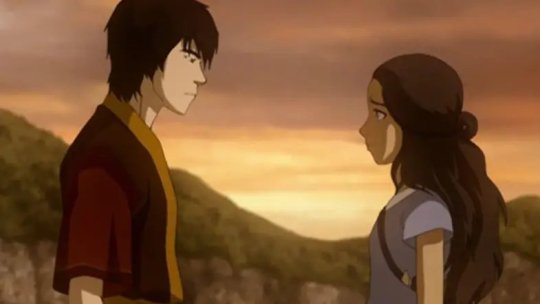
How The Bond of Zuko and Katara Enhances the Themes of A:TLA
When a subplot is intertwined with a story’s core themes, it creates a more cohesive experience, resonating more profoundly with viewers. For this reason, a good writer must always aspire for a coherent narrative in all of its aspects. So, what are the themes of A:TLA, and how do Zuko and Katara fit into them? To answer that, I’m going to break down each theme and discuss how it relates to the pair.
On Destiny
Your destiny might be unexpected, controversial, but it’s yours. No one can take it away from you. In Lake Laogai, Zuko and Iroh shared the following exchange:
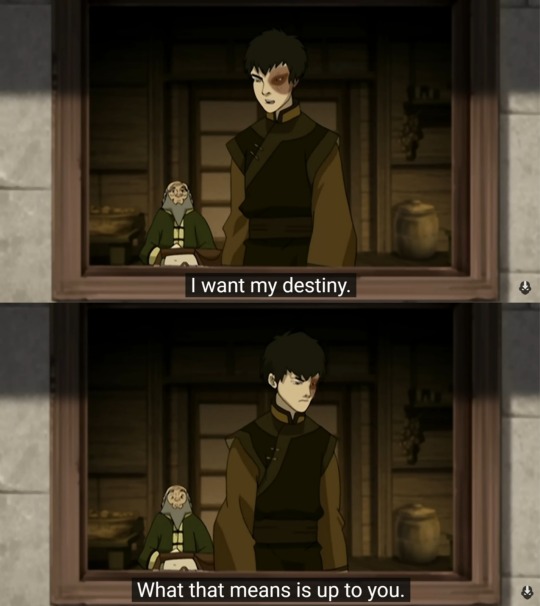
Even if people try, even if it isn’t acceptable to other people. Your identity will always be there, and you must make the choices that reflect your identity will always be there, because it’s your destiny. Near the series finale, in Sozin’s Comet Part 2, Iroh said:
“Sozin's Comet is arriving, and our destinies are upon us. Aang will face the Fire Lord.When I was a boy, I had a vision that I would one day take Ba Sing Se. Only now do I see that my destiny is to take it back from the Fire Nation,so the Earth Kingdom can be free again”.
In the end, everyone goes to their destinies. The destinies that they’re forging. Aang will spare the fire lord, Toph will use her metalbending to take down the airship, and Zuko and Katara will stand side by side against Azula. Who would have thought? Your destiny might be really surprising. No one could have guessed that Toph would invent metalbending, or that Aang would meet a lion turtle, or that Katara would stand by her former enemy’s side - by Zuko’s side.
Katara and Zuko’s closeness fulfill the show’s themes of destiny by being subversive and unexpected. They are fire and water, the daughter of the chief and the fire lord. Their friendship is rather odd, but it’s their destiny - not what was forced upon them. Moreover, their bond is subversive because it didn’t start as lovingly as it ended. Zuko and Katara were enemies, no one could have anticipated that they’ll grow close, but as I said, and the show said, destiny can come from an unexpected place.
On Diversity
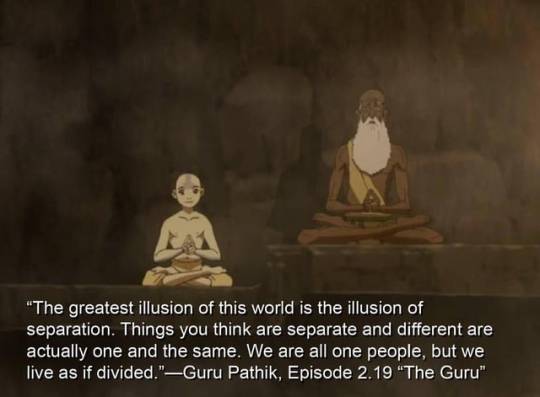
Separation is an illusion as well as the four nations.
Zuko and Katara were not only enemies, from opposite sides of the war, but they were polar opposites – the Prince of the Fire Nation and the last waterbender of the small Southern Water Tribe, fire and water. However, all of these differences didn't matter for them to form a beautiful friendship. Because they're not actually separate, they're both kind empathetic people. They have much in common. The superficial predetermined differences aren't separation. They're one in the same.
Additionally, one will gain from learning about the other nations, or as Iroh put it:
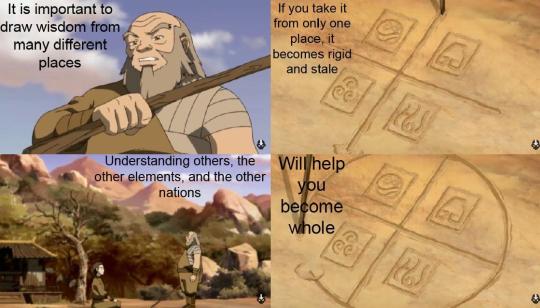
Zuko and Katara leaning into their opposites ties into the theme. In fact, Zuko himself learned to redirect lightning from a waterbending technique.
On Redemption
Many characters in A:TLA were given a chance to redeem themselves. From Mai and Ty Lee redeeming themselves by betraying Azula near the end of the show to Iroh whose redemption has long ended before the story starts. A:tla firmly tells us that while the path to redemption can be long and hard, it’s a path worth paving and it’s yours to carve. Zuko’s redemption arc specifically is praised as one of the best redemption arcs in tv history.
A part of Zuko’s journey towards redemption is his interactions with Katara. Earning her forgiveness is his final step into integrating into the Gaang, and his final act of redemption is to jump in front of a lightning bolt for her. It’s significant that it’s Katara who represents these milestones in his arc. He redeems himself to everyone, but not in the same way as Katara. The path to redemption through Katara’s eyes is longer and ends with a bang.
On Morality
Black and white notions of the world are incomplete. The Fire Nation isn’t all evil, as seen in The Headband, their citizens are simply indoctrinated. And there can be band people on the other side of the war, such as Jet. Fire isn’t just destruction, it’s also healing and life. And the opposite of fire can be just as destructive, as seen in The Puppetmaster when Hama showcases her bloodbending. In 06×03 A\ang concludes the following:
“Anyone’s capable of great good and great evil.Everyone, even the Fire Lord and the Fire Nation have to be treated like they're worth giving a chance.”
When Zuko and Katara first met each other, they thought of each other as enemies and nothing more. Katara saw Zuko as his worst self and the manifestation of her hatred of the Fire Nation. In the Crystal Catacombs Katara described him as "the face of the enemy". She saw him as all black and no white, but then he opened up. They discover they actually have shared experiences despite being on opposing sides. When he betrayed her, it seemed to confirm that they're not similar, that everything Katara thought of Zuko was correct. Of course, he came back, but Katara can only forgive him once she lets go of some of her hatred of the Fire Nation. His connection to Katara proves that they’re both seeing the world as shades of gray.
—————————
In conclusion, the profound connection between Zuko and Katara enhances the themes of the show and their connection is a perfect example of the messages it’s trying to put out. Rather it’s about destiny, morality, diversity or redemption, Zuko and Katara’s relationship is remains one of the most relevant examples of these themes in the show.
#zutara#anti anti zutara#pro zutara#zutara analysis#zutara evidence#zutara forever#zutara meta#zutara nation#zutara should have been canon#zutara supremacy#zutara was robbed#zutarian#zuko x katara#katara x zuko#kataraxzuko#zukoxkatara#katara#zuko#atla
165 notes
·
View notes
Text
Let's Talk About Yor
Something is going on with Yor lately. Have you noticed it too?
Even though she wasn't in every chapter of the latest big arc (Wheeler-Yuri-Twilight confrontation), the arc started with her and ended with her and I think there's a reason for that.
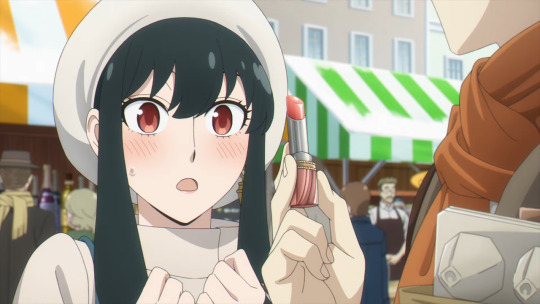
As I mentioned before, Yor is a very emotionally intelligent character. She surpasses Twilight on this, who struggles with his own emotions and the emotions of others too.
So the way Yor works is by becoming aware of an emotion or a change within herself and then she reflects on that. Then, things happen to her and she reflects some more about that issue or emotion, which is usually connected to the things that are happening around her.
Example: Look at the chapters leading to the cruise arc. Fiona showed up and Yor started questioning her place in the Forger family. Everything seemed to be cleared out during that same visit, but then Loid went to a tennis tournament with Fiona and Yor kept thinking about this. When the tennis challenge happened, even though Yor won, this didn't make her feel better, quite the opposite. Finally, Loid reassured her during that date in the bar, right after he got kicked on the chin.
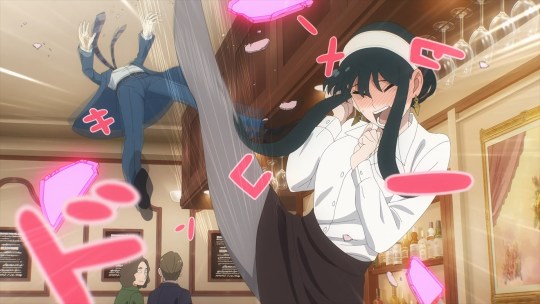
That should have been it, right? Wrong. More things kept happening to Yor and she kept thinking about her place in the world, whether or not she should keep her assassin job until we finally get to that moment when she realizes her reason to keep on living and protecting is her family.
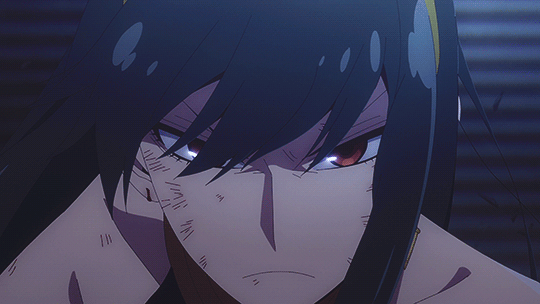
I get the feeling we're now at a similar point in the manga. Somehow everything keeps pointing to Yor, specifically to Yor and her relationship with Loid. Look at what's happening to Yor and tell me what you think is coming:
1.That chat with her office friends about gripes, marriage and welcome home kisses.
2.The welcome home kiss that never happened when she got home.
3."The fight" she had with Loid, or more specifically: thinking about her husband while he was shot by Yuri. (Those sad eyes said a lot!).
4.That honest talk she had with Twilight where she tells him she wants to take care of him.
5.Her chat with Yuri, where her brother asked her if she loves Loid.
6.Meeting the Authens, a real marriage, and seeing them kiss. (The Authens' Theory here.)
See what I mean? If we take into consideration the way Yor grows as a character and the way she realizes things, then where is this heading?
It's clear Yor is about to realize she has feelings for Loid!
The way the story keeps pointing at a kiss with giant arrows is not a coincidence. For Yor, who is inexperienced, a kiss would mean true love and a real marriage (which is what she wants). If the almost kiss didn't happen at the beginning of the story (when Yuri visited) is because back then, the marriage wasn't real. Maybe they liked each other and a little more, but they had just met.
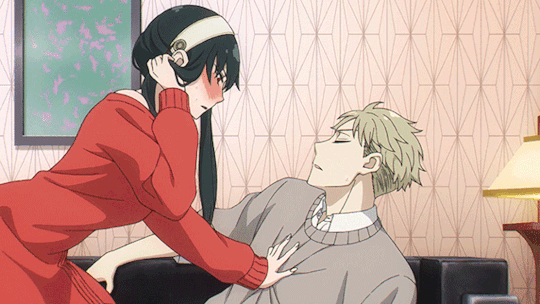
Now about the first twiyor kiss...we'll you can read my theory on that here. And I'd like to add a little more...
I know I said I wanted it to happen in the movie, but I admit I was being waaaay too optimistic about it. Sadly, I don't think it'll happen in the movie. Like some of you mentioned, that moment belongs to the manga and I agree.
However, all that is happening with Yor is leading to that kiss. I still believe she'll be the one who takes that step and will be the one who kisses Twilight. I insist; it's part of her character arc, which is about gaining confidence in herself, becoming a woman, and feeling worthy of love.
At this point, she's on the verge of figuring out her own feelings and after that happens, she needs to accept them and then figure out how she wants to proceed. I believe it won't be an easy task for her. Knowing Yor, she won't want to inconvenience Loid and impose her feelings on him. She also won't want to risk what she already has: her family. So it will take a while and maybe a little encouragement (maybe from the Authens?) to get to the point of actually want to act on these feelings.
But it's coming.
#spy x family#twiyor#loid forger#yor forger#sxf#spy x family meta#spyxfamily#loidyor#loid x yor#spy x family anime#spy x family manga#spy x family theory#twilight#spy x family twilight#thorn princess
782 notes
·
View notes
Text

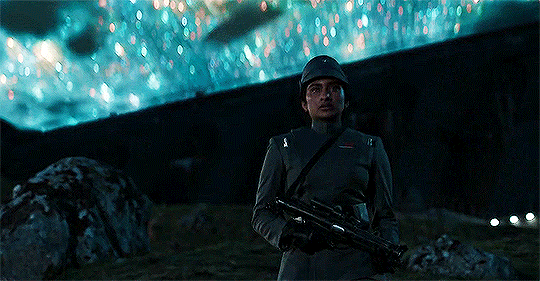
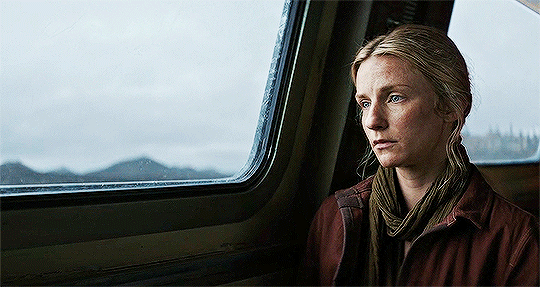


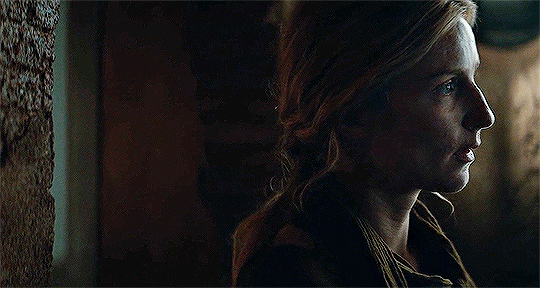

Velcinta September, Weekend #2 - connect
Cinta and Vel stay connected by a window motif throughout the second half of the season. More meta thoughts on the symbolism under the cut.
Starting with Gorn’s description of the Eye, Vel and Cinta’s story is always connected by the motif of windows. Cinta watches from the ground as Vel and the others escape through the Eye, aka “the window to the galaxy.” They reunite on Ferrix but soon after have to separate again – Vel takes the shuttle to leave, staring out the window down at the city; Cinta watches the Andor place through the window in the nearby room. We get a blurry view of Vel and her cousin through Mon’s window on Coruscant. And of course in the finale, Vel returns to Ferrix and pleads with Cinta to “come away from the window” and relax for a moment. Cinta does, even if slowly.
From what I can tell, there are two main things symbolized by windows in stories – freedom and escape, and a portal between one’s inner and outer worlds. I’d say sometimes these blur together within the symbol as well. In this case the first mostly pertains to Cinta, even though Vel was the one to escape Aldhani through the window of the Eye. She longs for an escape from the pain she has suffered at the hands of the Empire, for freedom from its oppression. It is her singular focus, underlined by the intense stare out the window in episode 8 and later 12. She cannot take her eyes away from the window, from the chance to get closer to freedom.
The barrier between the inner and outer worlds applies more to Vel, the character with the most stark contrast between the self they present to the world (or at least the world that once knew them) and who they really are or want to be. Even in the scene with Mon – which starts with that blurry, rainy window – Vel cannot be fully herself and tell Mon what she’s done on Aldhani. And all the rest of her family knows her only as some spoiled rich kid who just likes to go off traveling.
So what does this symbolism and connection mean for their arcs? I find it interesting that when we first meet them it’s out in the wild on Aldhani, where there really are no windows. Out there in the highlands they have work to do of course, but compared to the rest of their lives this is a place where they can be free and escape, where their inner and outer lives don’t have such a barrier between them. Then the Eye comes, closing the window between them rather literally. Vel escapes, leaving behind the most important part of her inner life. And Cinta is left watching, trapped there on the planet and literally wrapped in the uniform of her oppressors.
In episode 8 during their reunion in the cafe, they’re on a bit more even ground with Cinta having also escaped Aldhani, but now the windows are there and they are still on opposite sides of them. The escape Vel craves is not the same one Cinta does, and Cinta points this out to her with the iconic mirror line: “I’m a mirror, Vel. You love me because I show you what you need to see.” And the thing is, they BOTH reflect what the other needs – Vel to look outwardly toward the fight, Cinta to look inwardly to a connection that will keep her from losing herself to that fight.
When they part again they are very beautifully shown looking through the windows between them, seemingly at each other – like reflections in a mirror – but not really. Because this is about windows, not mirrors. Again, they’re each looking toward the thing they want, the thing the window is either a portal to or a barrier in the way of: freedom from the Empire for Cinta, who is surrounded by the Empire and longing to take the fight to them; and the comfort of her inner life for Vel, who knows she has to go back to Chandrila and pretend to be the spoiled rich girl.
This all culminates in the final big scene for them, when in the finale Vel asks Cinta to come away from the window. She has gone back to Coruscant and used Cinta’s words to help keep Mon’s focus on the fight, and she’s returned to help finish this job now. She even tells Cinta that she was right to miss picking her up in favor of keeping an eye on the ISB. She’s now looking outward at the fight and what needs to be done, but Cinta still needs to turn around and look inside, look at her inner life and how dark it’s become. Vel gently orders Cinta to turn around, turn away from that window she’s kept her eyes on all this time. And she does, and finally they are looking at each other but also in the directions they’ve avoided until now – Vel facing the window, Cinta facing inside. They both still have some work to do, but at least now they're looking and moving in the right direction.
The window both separates them and connects them the whole time, and finally they are on the same side of it, even if only for a while.
#had this rotating in my brain for almost two years now#finally managed to put it in words#andor#velcinta#vel sartha#cinta kaz#cameo:#gorn#velcintaseptember#my posts
120 notes
·
View notes
Text
Why, out of GF, Amphibia, and TOH, only Luz didn't have to leave her new world behind:
I've seen people complain about Amphibia and to a lesser extent, Gravity Falls, for having their series end with a goodbye; the main characters having to leave their found families and this world they've grown to love and return to regular life. But the thing is, the three shows all have MASSIVELY different morals, that each fit in with how the goodbyes (or lack thereof) work into the finales.
Gravity Falls has a large theme of temporary goodbyes and reconciling. Stan and Ford being the primary example. But there are others: Soos and Melony, Wendy and Robbie, even Dipper and Mabel to an extent. The show builds upon this with Gravity Falls being a VACATION, they aren't trapped there, they could theoretically go home at any time. Episodes such as Summerween and Dipper and Mabel Vs. The Future also build on the tone, telling that it's okay to both grow up and move on, but you don't have to leave behind what you once loved in doing so.
The final conflicts (Wierdmaggedon) are caused because of characters not being able to let go. Stan couldn't let go of Ford, Mabel couldn't let go of Gravity Falls, Gideon couldn't let go of Mabel.
Gravity Falls teaches the viewer that even if you love something, you have to let it go, and eventually it will return. In the words of Bill Cipher: "We'l meet again. Don't know where, don't know when. I just knew we'll meet again, some sunny day."
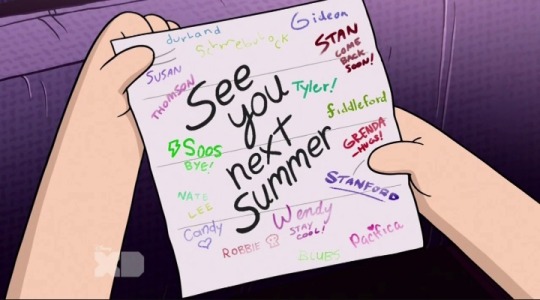
Amphibia has a similar theme of Gravity Falls, but it takes it further. Amphibia tells you that if you don't let go, sometimes things will only get worse. The primary example for this is the show's catalyst event: Marcy getting Anne to steal the Music Box. Marcy chose to go to Amphibia, rather than move away, and she dragged her friends into it with her. Instead of having a long distance friendship with Sasha and Anne, she took them to an alternate dimension in order to spend eternity on a massive adventure, and it got her killed. Marcy and Anne died and Sasha tried to kill herself.
And that's only Marcy. Sasha was a control freak that bordered on yandere at the height of her villain arc. Sasha couldn't accept that Anne was beginning to move on from the toxic friendship that the Calamity Trio had locked themselves into.
The trio were horrible to eachother, pre-character arcs, and they needed to focus on self improvement before they could even hope to be good friends. In the time between 'All In' and the epilog, the Calamity Trio would not have actually been able to be good for eachtoher. They say they forgive eachother, but that was forgiveness given during a WAR. Post show, the real feelings would start to bubble up. Anne's resentment for the betrayals, Marcy’s abandonment issues, Sasha's definite self hatred. The trio HAD to split up to have any semblance of a friendship.
Amphibia tells its audience that not all good things can last, and if you obsess and force it to stay, it can destroy you.
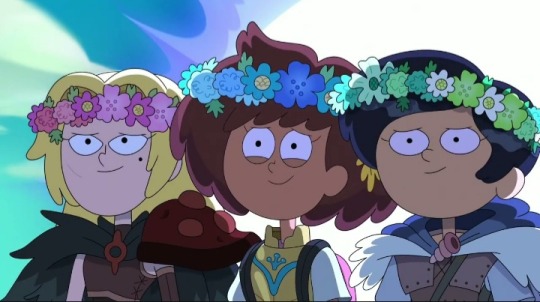
The Owl House has a completely opposite moral. It tells you to find your people, and fight for them.
Luz lived in the Human Realm, but it was never her home. Her home was with Camila and Manny, but when Manny died, Camila and Luz's relationship began to falter. That world wasn't her home. When Luz found the Boiling Isles, she was always supposed to be able to leave. This wasn't a summer trip she didn't want at first, or a one way portal. The Boiling Isles was HER choice.
Luz picked Bonesburrow. Luz picked Hexside. Luz picked The Owl House. Her home was always meant to be The Boiling Isles. She only started trying to find a way back to Earth because the choice was taken from her. Luz no longer had the choice to go back to the Human Realm. In fact, the only time Luz chose Humans over Isles was when she was PUNISHING herself for helping Belos.
Luz got to stay in the Boiling Isles because TOH tells its audience that where you start isn't where you should always stay. Find your place and find your people. And when you do, hold it dear and never let go. "Us weirdos have to stick together."
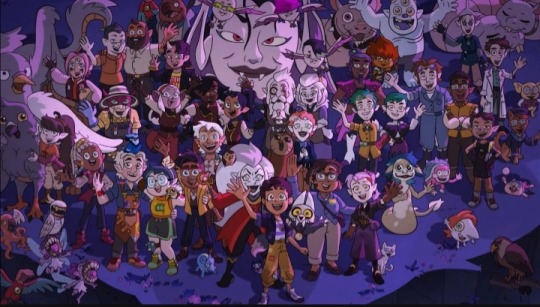
#the owl house#amphiba#gravity falls#luz noceda#anne boonchuy#sasha waybright#marcy wu#mabel pines#character essay#monologuing to the void#gravity falls spoilers#amphibia spoilers#the owl house spoilers
1K notes
·
View notes
Note
does ikalgo have deeper significance to killua's character? i get that hes like a new friend for killua but why does it feel like he was portrayed so importantly to killua's character during caa? its like theres a deeper meaning, why did killua go out his way just to save ikalgo from those two chimera ants when they entered the building? and why did he look so hesitant? he had thoughts that said "what am i doing..? why the hell am i going the opposite direction?" or something like that. idk it just feels like togashi was implying something abt killua there but i cant figure out what that is. do u have an idea?
Hello! This is a great question!
Ikalgo's friendship with Killua is vital both to Killua's development and also to Chimera Ant arc as a whole! I can explain that significance.
Throughout much of the series, Killua tags along with Gon and primarily focuses on him. He befriends other people, certainly, but he generally does this through Gon--it's not like he's going out of his way to make these friends on his own.
In Chimera Ant Arc, the connection between Gon and Killua gets somewhat disrupted by the events that happen, and Gon's focus shifts primarily to saving Kite and his revenge on Pitou, leaving Killua to worry and feel somewhat left behind and helpless (partly as a result of the the Palm situation as well).
When Killua splits off from Gon to try and save civilians, he meets and a battles an enemy at the time, Ikalgo.
During their fight, Killua gives Ikalgo a choice: Either sell out his friends by revealing their nen powers, or die. Ikalgo chooses to die rather than betraying his friends, and Killua is able to relate to this loyalty. He spare's Ikalgo's life and tells Ikalgo that if they'd met another way, maybe they could have been friends.
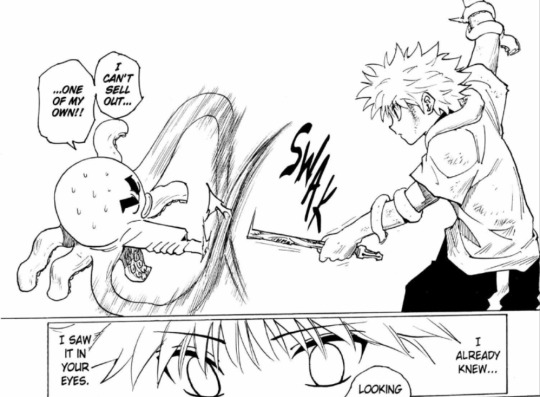
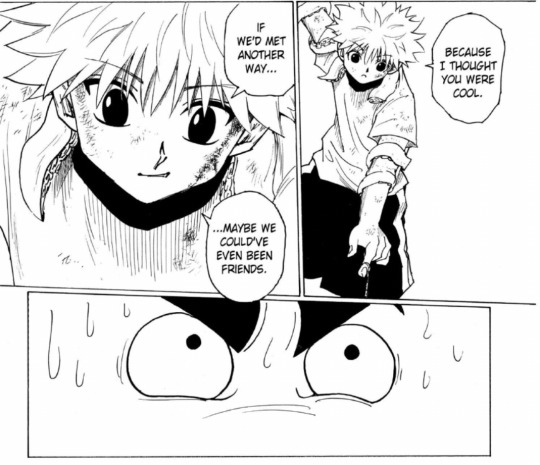
Killua's kindness in empathizing with Ikalgo and sparing him is the only thing that saves his life later when he's bleeding out from the needlefish darts. Had Killua not extended that mercy and said those kind words to Ikalgo, Ikalgo would not have saved him, and he would have died.
It's interesting/neat how the scene right after Ikalgo saving Killua from the needlefish involves Gon having his own encounter with another friendly Chimera Ant, and the tone of their conversation is quite a bit different:
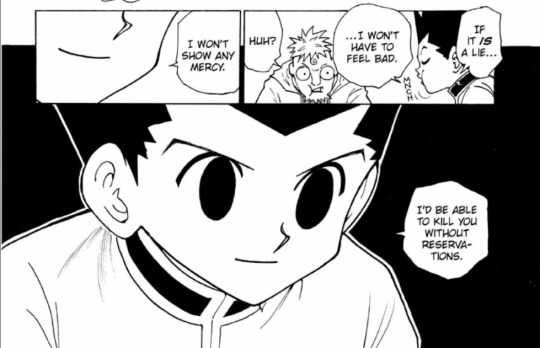
Contrast is so important in Chimera Ant Arc!
Anyway, when Killua shows Ikalgo mercy, makes it clear that they're friends now, and invites him to come along and be part of the human side of the war, he essentially becomes to Ikalgo what Gon has been to him: Someone who represents light, and who represents a path forward to a better life. In this arc, Killua worries that he doesn't deserve a place at Gon's side, but at the same time here he extends the same kind of light and hope that Gon gave him to someone else.

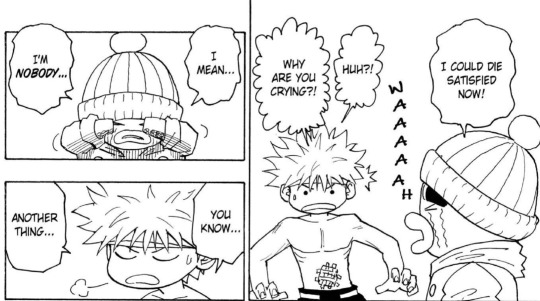
As for the scene where Killua breaks off away from Gon in the Palace Invasion in order to protect Ikalgo, this continues to show Killua's world expanding outside of Gon. Notice how in this page, it clearly shows Killua leaving Gon behind--they have their backs to each other, which is a frequent image in this arc. His mission was to protect Gon and make sure Gon could complete his revenge against Pitou, so deviating from that mission is both shocking to him, and potentially dangerous, but it shows that he's starting to protect and care for others as well as Gon.
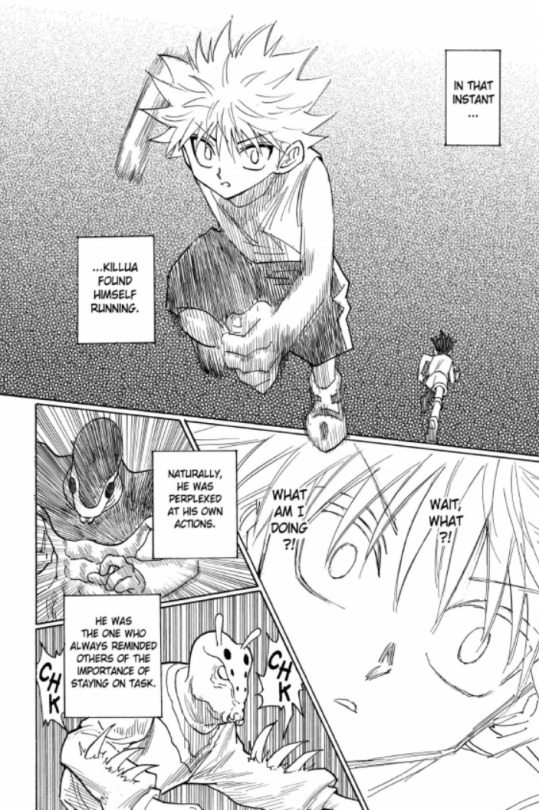
Now, I want to be clear that I see this as a positive step for Killua. At this point in the series, Killua had made Gon his entire reason for living, essentially, and him going outside of that and making other friends and protecting and caring about them is a vital step for his character. It's showing that he's becoming a more expansive, mature person who can care for multiple people (or ants) at once rather than centering his entire existence and sense of self around one person. He made this action as quickly and efficiently as possible so he could get back to Gon's side, but he did go out of his way and leave Gon behind momentarily, and even he is surprised by this.
And while obviously I adore his nearly single-minded love and devotion for Gon, with what happens between them in this arc he needs to have others in his life besides Gon, and it's part of his transition into also being the light for Alluka and Nanika. It's a result of Killua's own innate kindness and empathy and the choice he made to leave his previous life behind, but also, he was able to reach this point partly because Gon showed him the love and encouragement he needed to become the person he is.
Now, as for Ikalgo's role in the arc as a whole: He's part of a chain of kindness and mercy that ends up changing the entire outcome of the Chimera Ant arc. This post puts it incredibly well. The chain of kindness started at the beginning of the series, with Gon befriending and rescuing Killua in spite of his background, which then eventually leads to Killua sparing Ikalgo (who then saves Killua right back), and then Ikalgo sparing Welfin, and then Welfin giving Meruem Komugi's name so that they got to be together in the end. Ikalgo shows the consequences of Killua's kindness, which are also the consequences of Gon's kindness, in part.
A major theme of the series and of Chimera Ant arc is that love and kindness are transformative, and Ikalgo has such an important role in demonstrating that theme.
#hxh#hunter x hunter#ikalgo#killua#gon#welfin#chimera ant arc#killugon#gonkillu#meta#long post#anonymous#my posts
296 notes
·
View notes
Text
The Hobie Brown Punk Playbook - Anarchism & Hobie's Arc
A short series where I analyze the political, historical, musical, and romantic influences of Hobie Brown, and how it affects his arc, design, and character.
1) Anarchism 101 / 2) Punk 101 / 3) Hobie Characterization Guide (How to Write Hobie) /4) Punk & Hobie's Design / 5) Romance in the 70's
_______________________________________________
Why Hobie's Arc is the perfect metaphor for Anarchy and Anti-Establishment:
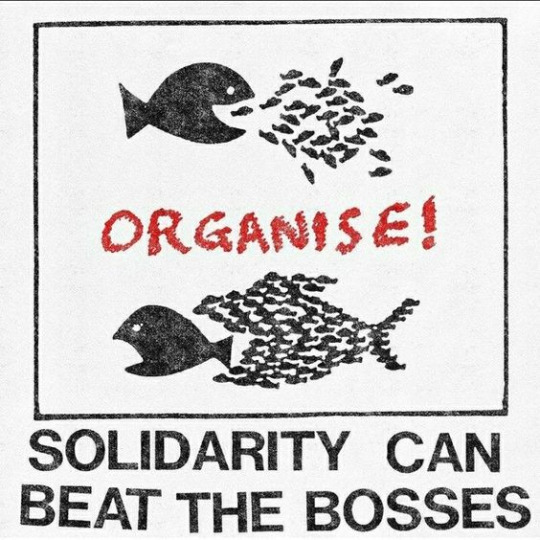
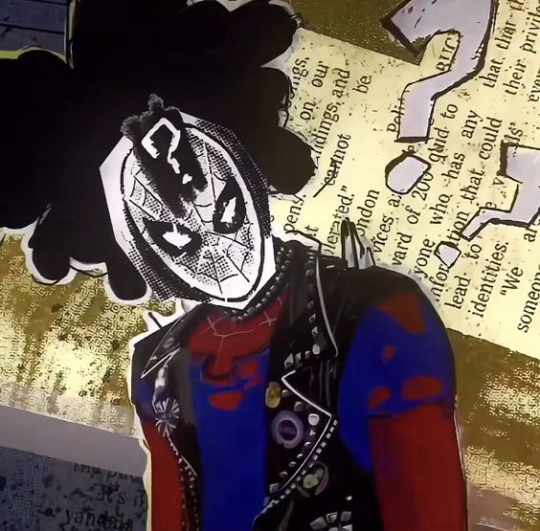
What is Anarchism?
What's an anarchist, and what makes Hobie one?
In most places, Anarchism is defined as:
a political theory advocating the abolition of hierarchical government and the organization of society on a voluntary, cooperative basis without recourse to force or compulsion.
Which means that, as an Anarchist, Hobie believes that all forms of authority that involves a hierarchal power should be abolished and destroyed.
Anarchists opposes any and all power structures in which a single person, class, or entity rules over a body of people.
Anarchism is a thought system that, at it's core, is anti-government, anti-monarchy and anti-cop. It's goal is to protect and highlight the importance of equality and community but also freedom and individuality as well.
Although many people assume anarchy is about chaos - and denying any and all structures - if anything, it’s actually the opposite.
Anarchy is about balance -
When we look at the definition of Anarchy, we can see two complimentary ideas. ______
The first is the 'advocating the abolition of hierarchical government' - which is the sentiment Anarchy is most known for. It's the opposition of power structures in which one class or group rules or gains privilege over another - cops and civilians, the government and citizens, Spider-people and the multiverse, Miguel and the Spider-people...etc.
For the purposes of this post, I'll call it the First Pillar of Anarchism, and it's the basis for one of Anarchism's foundational beliefs: direct action.
(Which Hobie is the king of)
The second idea is one often overlooked, but just as important, and I'll talk about how much it colors Hobie's characterization in a second.
The organization of society on a voluntary, cooperative basis. Anarchists believe in equality, and the power of the collective and working together as a unanimous unit.
But they also believe in freedom of choice, and the choice to be independent.
When working in large cooperative groups, there is the risk of a shared identity that may stifle or assimilate it's members. Just as much as Anarchists believe in unity and equality, they also believe that a society - or any group - should be voluntary. And that sticking out from the pack is okay and even encouraged.
They believe people reserve the right to not participate at all, and that it is their right to differ and challenge the pack, if they so want to.
In the perfect anarchist world and situation (in my opinion,) - No one rules over the collective, and the collective rules over no one.
When you put those two together you get Anarchy. A balance of community and self.
And although we don't live in an anarchist utopia, Anarchists are people who live life fighting for the equality and unity of others, as well as their independence and freedom to be who they are outside of others.
In short, An Anarchist is someone who believes in equality, community, freethinking, and most of all freedom of choice.
Starting to sound like anyone we know?
What makes Hobie the perfect Anarchist?

Hobie is Anarchy personified. Literally.
Hear me out.
When we look at the definition of Anarchism next to Hobie's actions, behavior, and beliefs - we can see the writers created Hobie and his arc to be anarchy in it's purest form.
Anarchy is described as:
a political theory advocating the abolition of hierarchical government and the organization of society on a voluntary, cooperative basis without recourse to force or compulsion.
Hobie only has roughly ten minutes of screentime, and I wrote (here) exactly how the writers squeeze meaning into (quite literally) every-line he has.
In every line and frame the writers are intent on having Hobie move towards the 2 specific goals and motives on Anarchism, backed by his punk and anarchist morals.
Firstly, he approaches Miles to advocate the abolition of Miguel's hierarchical society, emotionally and mentally encouraging Miles to oppose his authority.
All of Hobie's speaking lines are dedicated to this purpose - becoming an ally to Miles (and other Spider-people) and inspiring rebellion.
This is reflected by his opposition to the ideas of anomalies, and Miguel's rule.
I just wanna highlight, that when Hobie meets Miles - neither he nor Miles are aware that Miles intends to avoid his canon event.
At the point of their meeting, Hobie only knows that Miles has disrupted Pavitr's canon event, and that Miles himself in an anomaly.
Hobie opposes Miguel's hierachial society, his rule over the timeline and multiverse, and his use of force and threats of violence. By advocating for the abolition of Miguel's society and urging Miles' rebellion against Miguel, Hobie is directly engaging in the first pillar of Anarchism.
When Hobie's efforts pay off and Miles escapes Society capture, he's goal changes toward the second pillar.
Hobie recognizes Spider-Society does not operate on a voluntary, cooperative basis - as their canon events are mandatory by force and compulsion.
And because of this, he thinks ahead and uses his self-made watches in order for him, Gwen, and Miles to exercise their right of choice.
From the moment he quits, all of Hobie's behavior is dedicated to this purpose - getting Miles and Gwen out of the society, and helping Miles avoid his incoming canon event.
The Spider-Society is everything Anarchy stands against.
Anarchy stresses volunteered and cooperative effort for a reason.
I spoke earlier about how in cooperative groups, their is a risk of a shared identity within a group that forces assimilation and cooperation.
And Spider-Society is the perfect, and most literal example of this.
Spider-people are (literally) the 'same person'. Those in the Society are united by the shared identity of being Spider-people. This identity is mandatory for entry - and because Miguel ties canon events to the identity of a Spider-person, the canon events become compulsory and mandatory as well.
I mentioned before that at the time of meeting Miles, both he and Miles had no idea about Mile's incoming canon event. He, like Miles, only learns this when Miles announces that his dad is about to be captain - in front of Miguel.
When Miles escapes and Hobie quits, from that point on - despite the fact he's not fully shown on screen again - Hobie still manages to act on and stand by Anarchism. From then on, every single one of his actions is dedicated to opposing the involuntary, compulsory nature of canon and canon events.
Hobie interferes with the compulsive nature of canon by approaching Gwen's dad and speaking with him. He interferes with the involuntary nature of the Society's membership, by leaving Gwen the watch that allows her and Peter B. to leave, going AWOL.
___________________________________________________
As a character, Hobie is what is considered a insurgent. His purpose in the story and Miles' life is to inspire action and rebellion within him and the system.
And at his core, Hobie is meant to be a character that's meant to empower others - especially at their lowest point. That's what Anarchism, and Punk, is about.
Hobie is Anarchy personified.
Every one of his motives and lines are dedicated to it's purpose. Whether it's his first scene disarming Miles with humor and allyship, or him deliberately copying Society technology.
With every word and frame, Hobie inspires rebellion - defying hierarchy, and empowering choice.
With the people closest to them, he literally put the power of choice in their hands, whether it be Miles' palms, or the watch Gwen held.
In the battle against the Spider-Society - an organization of hierarchy, control, compulsion, and force - the writers chose to have Hobie's weapon of choice be Anarchy.
And it's really clear they see Anarchy for what it is - a system and tool of empowerment, compassion, and freedom.
And honestly, I can't think of any other words that can describe Hobie better (or than hot).
Hobie Brown is literally walking Anarchy idc idc you can't tell me different bye.
Find Part 2 - Punk 101 here!
__________
also have a couple more ideas and drafts of these, mainly examining: Punk and what makes Hobie punk, his design inspiration and fashion, the 70s history behind him, romance in the 70s, etc so uh yeah
#wake up hun new analysis just dropped#I love ANARCHY AND COMPASSION AND CARING FOR OTHERS#atsv analysis#hobie brown#spider punk#spiderpunk#across the spider verse#atsv#Miles Morales#Gwen Stacy#Miguel o'hara#spider-gwen#spider man#spiderman#marvel#long post#Hobie Brown Punk Playbook
777 notes
·
View notes
Text
"I'd rather have you than three meals a day.": a thematic analysis
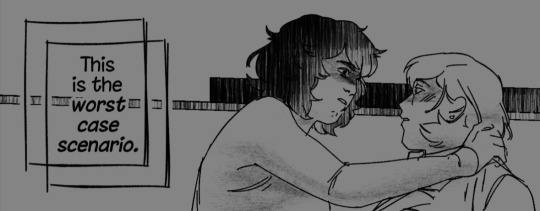
In February of 2024, a comic sprung up created by tumblr user Diesel (username rontra) based off of the Persona series. This comic, known under the title of "I'd rather have you than three meals a day." (which I will refer to as "failteacher yuri" for short), follows the story of two characters from the series: Isako Toriumi from Persona 3 and Sadayo Kawakami from Persona 5. These two characters find themselves entangled in each others' lives by complete happenstance, the comedic framing slowly revealing its fangs of intrigue and drama as more and more of both of their pasts come to light. Today, we will be discussing how the author explores themes of self-acceptance and facing one's past.
A small foreword...
As of the time I'm writing this, there are currently only 19 updates out so far of failteacher yuri, with a 20th on the way. I tried not to rush this analysis, but I also got really excited to write it! And also it's 4am!! So if I missed anything I am so so sorry...!!!
Next, I will be partially referring to characters in accordance with this chart, since this is important to the themes of the self in my opinion. Sometimes I don't specify. Bear with me a little please...
The True Self
There is the obvious point to start with, which is Toriumi accepting the fact that she is a lesbian. This is our beginning conflict in the story—quite literally in the very first page of the series—and it is the spark from which this story begins. As the story progresses, she grows more and more comfortable with her sexuality, trying more and more things with Becky.
The opening to #10 puts it quite well:
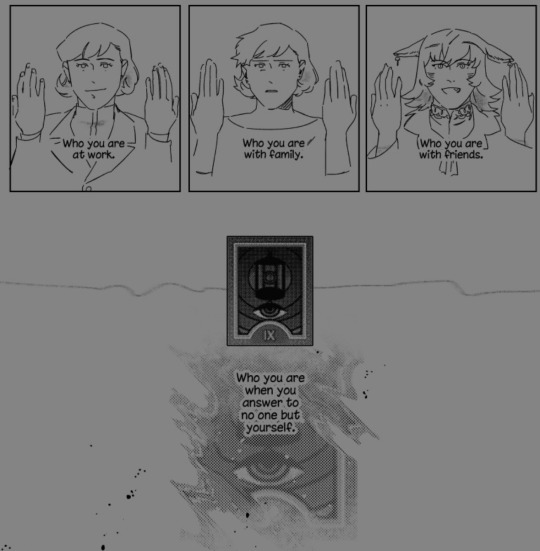
Toriumi is simply known by that when at work, a formal and polite guise. With her friends online, she's known under her username Y'ko. When fully alone, she is simply Isako. We meet her in the reverse order of this, knowing her first in a causal setting and graduating into higher grades of formality.
On Kawakami's side of things, we see that the idea of the persona is much more literal in the character of Becky. In a way, we meet her in the opposite way we need Isako, the difference between wearing the mask and having nothing to hide behind.
When she isn't under the guise of Becky and known formally at work as Kawakami, we simply are left with Sadayo. We meet her in this order, knowing her first with the mask on, watching it slowly slip as we begin to know more about her personal life.
These lines are neatly drawn for us and the characters at the start, the divide between these social masks cleanly cut. However, as time goes on and the relationship between the two deepen to new depths, the idea of the mask begins to mix with the true self, most notably in Kawakami's arc. As put nicely in #18...
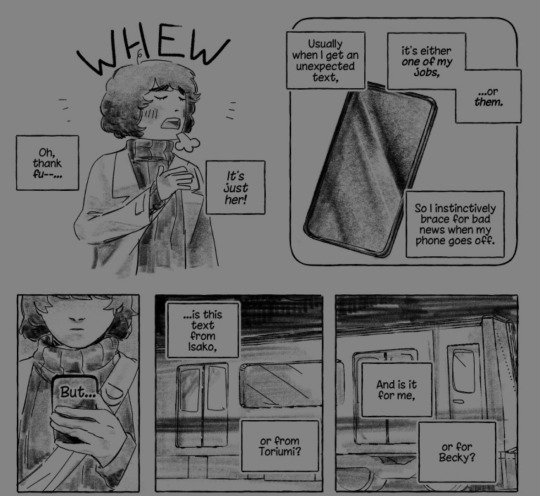
Comparisons to the Satoshi Kon film Perfect Blue have already been made by others, and even though failteacher yuri is noticeably different from the psychological horror story that the film covers, there are those elements of self-identity and the "real you" that make the comparison extremely interesting.
In the comic, it begins to grow increasingly more unclear for our characters which persona they're exactly speaking to in the moment—which words are intended for which mask, both to leave the lips of and fall upon the ears of. Which "you" is the "real you" if they all begin to feel the same—if the lines begin to blur?
The Burden of our Histories
Kawakami is the clear example of the two to start this section out with. The main thing Kawakami is hiding from Toriumi has to do with why she needs all of the money she scrambles for in the first place, which is revealed to us in #17.
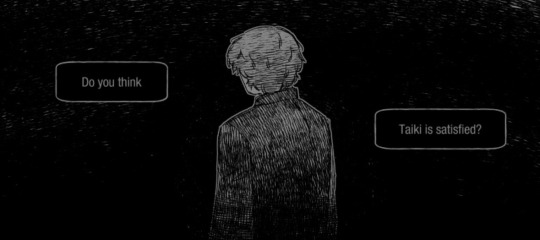
Kawakami has a secret to keep, and it's that she has been sending money to a former student's family, the student's name being Taiki. While in the comic it is unclear what may have happened to him, the usage of the word "forgive" implies that he had died, and that incident is either related to or has been blamed on Kawakami somehow.
The family demands money from her, more than her normal teacher's salary could possibly provide, so she turned to working at Victoria in order to make payments on time. With the tolls going up, though, who knows how long she can keep destroying herself...
But, of course, this isn't her only secret that she's kept. In #11, it's revealed that she took the Kanken at Level 1, the highest possible, and consequently the most difficult of all. At first, it's presented like it's an incredible feat, but this perception is shifted by Kawakami's own, believing it to have been something useless for the direction her life ended up going in.
The narration and informative boxes even begin to bend to the character's thoughts, becoming more and more unclear if the information the black boxes give in this update are objective or subjective, blurring the lines.

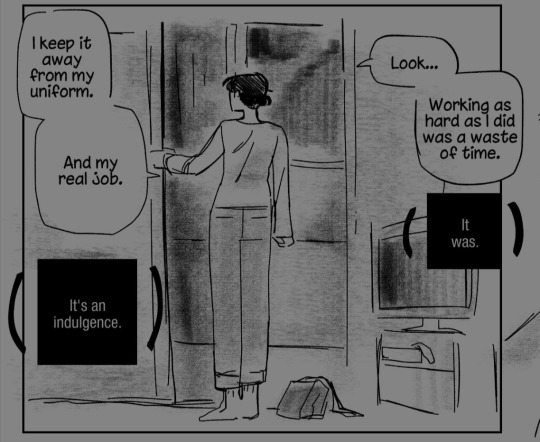
As much as Toriumi tries to hype up Kawakami and her accomplishments, the latter will simply never be able to see beyond her own self-perception.
Something that I also want to point out is how failteacher yuri utilizes onomatopoeia, creating a sense of pressure on our characters. It's almost comparable to the manga The Summer Hikaru Died, in which onomatopoeia is used to either create or alleviate tension in a scene, the sounds of the environments becoming almost deafening. The specific update from failteacher yuri I want to point towards is #18, which uses the sound of the rain in the background to create a barrier between Kawakami and Toriumi, with a side-by-side with a more recent update of The Summer Hikaru Died:
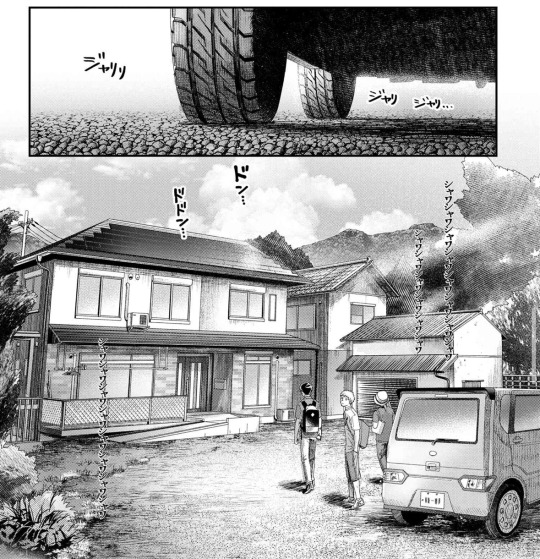
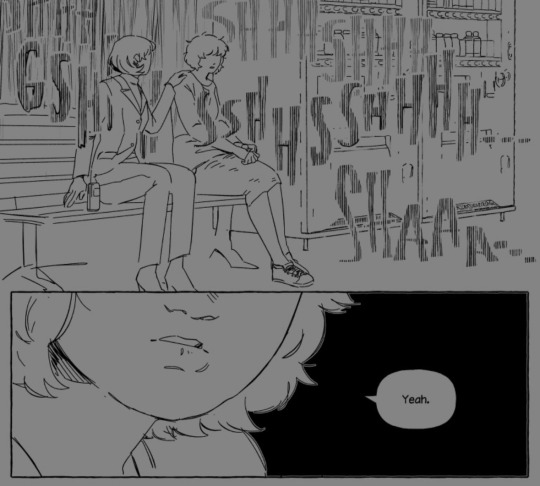
Kawakami isn't the only one keeping secrets, though. Toriumi, while much more subtle about it, is keeping a key part of her past hidden up her sleeve, and this has to do with the moon. Blink and you miss it, only overtly pointed out in update #13 and then much more quietly in #19, she continuously shows aversion to the moon, specifically the full one.
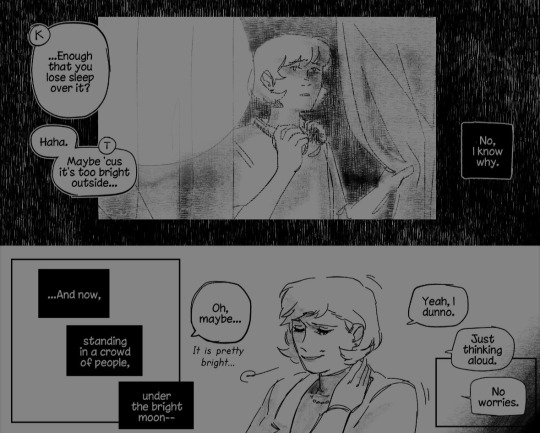
It's not like Kawakami hasn't caught on, either! During a small scene with Becky talking towards the audience at the start of #15 (the nefarious Becky is known to break the 4th wall), if you look closely, you can see that one of her notes reads "Scared of moon." I haven't played Persona 3 yet, so I can't give any fun lore insights, but what I do know is that the moon in that game is important and that Toriumi likely witnessed something she shouldn't have.
Additionally, there is also all of the stuff involving "A," which heavily has to do with Toriumi's arc of self-acceptance. Likely, something may have happened to "A" outside of Toriumi's control, and thus giving her a lot of complicated feelings about the subject. I personally don't expect a clear answer for what happened to "A," but it's still important to bring up.
Both parties are taking notice of where the other lets a part of their history slip, but neither have enough on them to be able to bring it up reasonably and not sound like they're taking crazy. Although, an inevitable tipping point is bound to be reached, especially with both of their troubles growing and growing. Something is bound to give.
How it comes together, in simple words...
Both Toriumi and Kawakami are dealing with very similar struggles, but they fight themselves tooth and nail on two different fronts, creating miscommunications and conflict between the two of them (and in some cases, outright lying). They are trying to navigate their increasingly dire presents all while their pasts haunt them, figuring things out and what they truly want from both themselves and each orher. What they want may not exactly be what they need, either, leading to further internal and external conflicts.
#13 succinctly states the ideas presented in the whole story so far, along with an amazing visual to boot:
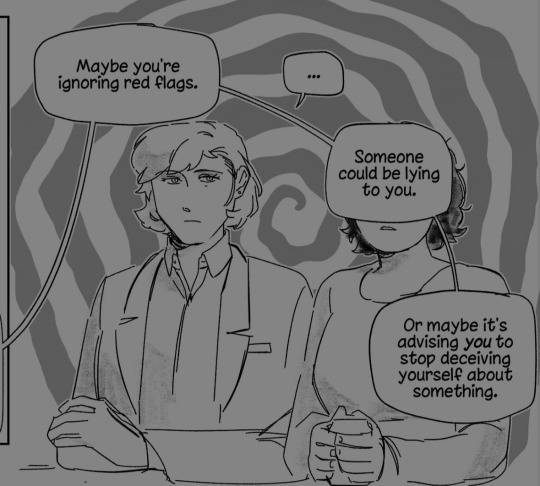
(I can't fit it here, but I highly encourage checking out the tarot meanings from #13 as well, which are linked at the end up the update, which you can view here.)
To put it simply, to lie to yourself and to others means to sacrifice, from relationships to self-perception. The only way to break free is to let go, to be your true self and to accept and face your past. The only way out is through.
#rambles#failteacher yuri NOW#I'd rather have you than three meals a day#persona#persona 5#persona 3#others art
131 notes
·
View notes
Text
Charlie as an underdeveloped character
One thing I was genuinely dissapointed by when watching Hazbin Hotel was that they never cared to dive into Charlie's Morality more.
I feel like a lot of people can agree that Charlie felt very flat/sidelined in a show she was supposed to be the main character of and I think that that's because they ran out of Character Moments for her. Her Backstory is pretty much just infodumped at the start so there's nothing you can really explore there (except for her relationship with her parents ig but they only really brought that up and resolved it in one episode). Alastor has the mystery behind him of what his goals really are, Angel Dust has his arc about standing up to his abuser, Vaggie has her dramatic backstory reveal thing and Sir pentious gets focus as the one real guest at the hotel and with his goal to be redeemed.
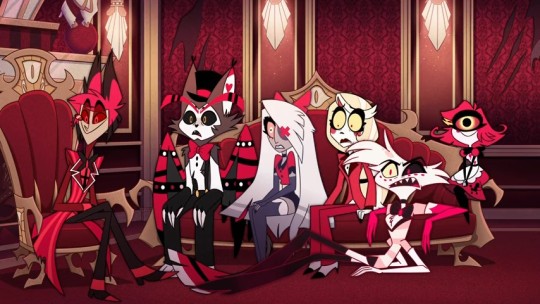
Charlie really has no conflict at all, which is weird since the whole plot is that her idea is relentlessly mocked and never succeeds until the end. But she doesn't have a personal conflict. All the issues she faces come from the ignorance of the people around her who don't support her, but never from who she is. She never has to change. They try to hint at this with her being possibly invasive and not respecting boundaries in the Angel Dust and Valentino episode. But the episode doesn't focus on her and Angel as they talk it out and she realizes how she might have to change as well (from how I remember it). It focuses on Husk and Angel's relationship instead.
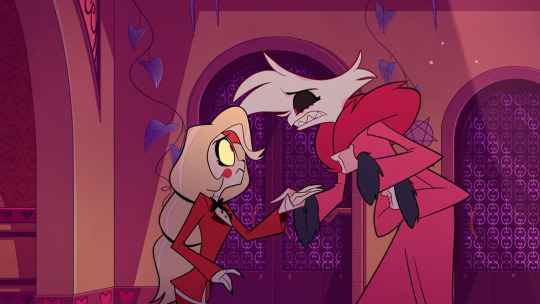
I feel like the easiest route they could've taken for her character was that of a moral dilemma. Charlie believes in second chances and being able to change demons and her opposite is Adam, who doesn't think demons should be redeemed and should just be killed instead. But it's never specified if Charlie truly believes everyone deserves a second chance or if there are restrictions to that. Adam sings a song in the first episode and explaines his reasoning for why he believes demons shouldn't be saved, which is that they had their chance to be good and didn't choose it and now they can't expect another one (I guess the real reason is that he's just an asshole who doesn't care but that's because Vivzepop can't write Villains so I'll just pretend like that's his real reason).
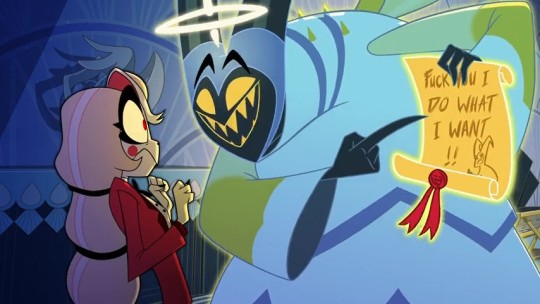
The problem is that Adam is presented as fully in the wrong and I just don't agree with that. I'm not saying he's right with killing random demons of course but the show never takes the time to consider that sometimes people go to hell because they are actually terrible and have done inexcusable things. Like yeah, someone who had an addicition or a mental health problem while they were alive obviously doesn't deserve eternal suffering without any chance for redeemability, but we know that those aren't the only people that go to hell (in the pilot it's literally confirmed that real life criminals like Jeffrey Dahmer are also down there).
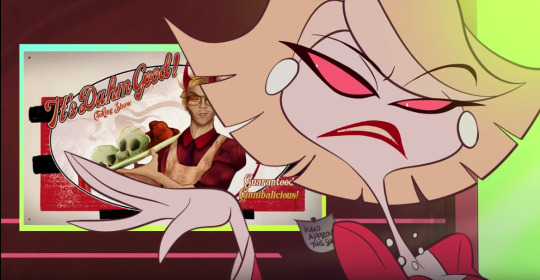
The show blatanly shows us characters like Valentino who are shown to do irredeemable things and be purely evil.
My question is just if Charlie would also look at someone like Valentino and say: "Yeah they deserve to be saved and get a second chance". She obviously thinks Valentino sucks, which we see in the Episode were she meets him.
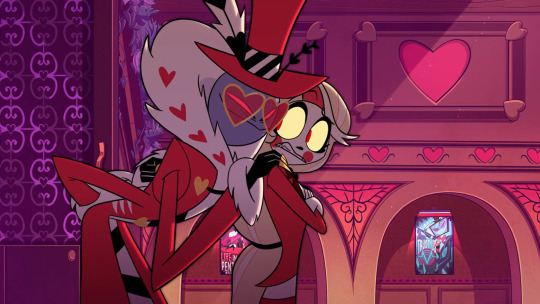
So like, what would she have done if in the second episode someone like him stood at their door and wanted to be redeemed instead of Sir Pentious. Does she draw a line? Or would she have really heard him out? Her morality with this "everybody deserves a second chance" attitude is so underexplored even though it would have been the perfect place to develop her more. If they had confronted her with an actually tough situation, where she is presented with a truly terrible person, they could've had two interesting ways to take her character.
She could've accepted the person and with that she'd have taken her role a fully 'good' saviour for the demons. Someone who is truly without judgement, or atleast believes that there is good in everyone that just has to be brought out. Which would've also given room to think about if people like that are even inherently good, if they can 'excuse' the actions of terrible people and still want to help them. This would have made her a very extreme character in her believes, but something coherent and definitive is actually something Charlie desperately needs for her characterization.
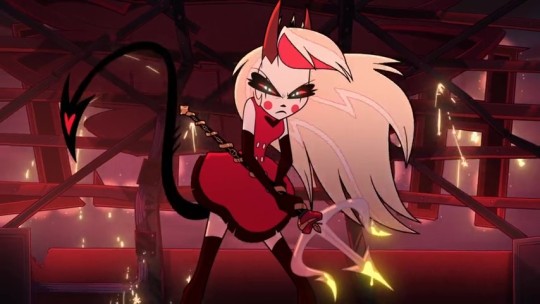
The other way would've had her reject the person and with that she would have to face the idea that maybe Adam isn't fully wrong. In that situation she would have found herself in a similar position to the Angels in heaven, where she basically is the one deciding over what's acceptable and what isn't. This could lead to her having a moral dilemma. Is she even a good person if she's deciding what's moral and what isn't? Can she just be okay with making exceptions to her idea to protect her people? Does she even want to view EVERY demon as her family? Or does she think there are some demons that maybe deserve death?

I'm just really dissapointed that the show takes such an interesting idea and such a difficult topic and then just does nothing with it. What we view as bad and good and which people we judge harder than others will always depend on social norms and the situation. It's a topic with no real right and wrong answer because there are so many things to consider. But this moral grey conflict that is literally one of the MAIN CONFLICTS in Hazbin Hotel is so incredibly underwritten, that it's not even funny.
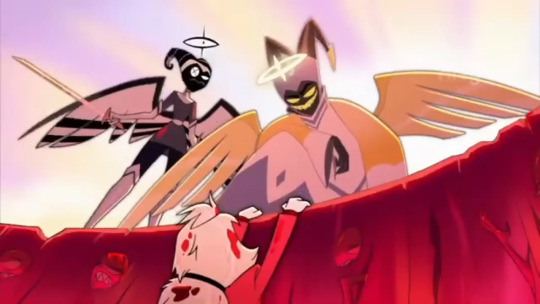
Instead of acknowledging the difficulty of the subject Hazbin does what it does best and takes the easy route with seemingly clear right and wrong sides. This is especially stupid, since morally grey characters are supposed to be the point of the show. Like there are these demons who have done bad things and who aren't perfect, but that doesn't make them bad people. Its about revealing that a person has layers (which the writing doesn't). This is also a big point in Helluva Boss, where characters like Blitzø or Stolas who mess up repeatedly, are supposed to be shown as still having interests, aspirations, and good things to them.
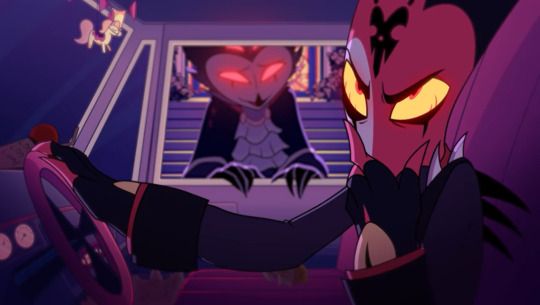
The easy route which is taken constantly in both shows however makes it so that Charlie is completely in the right and anyone who criticises her is one of the evil people who try to ruin her plan, just like Adam. Who's also such a straw man for anyone who even dares to bring any objection to Charlies ideas, because everyone who does is apparently a hypocrite who just doesn't understand her and would rather side with genocide (I wonder were Vivzepop takes her inspiration from).
Charlies writing was just really dissapointing with almost never any reflection being done on her part. She doesn't have really striking moments, discussions or ideas to her in a show she's supposed to lead. That's just an issue that comes with Vivzepop never really putting as much work into her female characters, even tough they would desperately need it.
I know that only the first season is out so far, but I highly doubt thay they'll bring up a discussion like this in s2. Especially since Adam is dead now and the Angels will probably try to work more with the demons, after Sir Pentious' redemtion and the reveal of the exterminations to them. Also the Vees, Lillith and Alastor will be more of focus from what we can assume by the ending scenes.
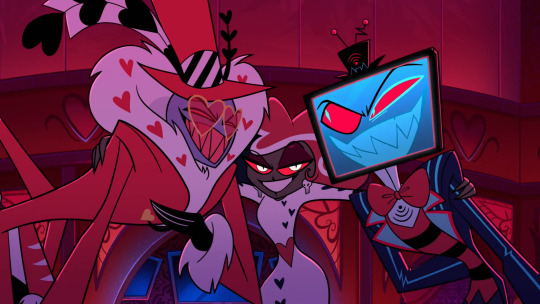
I just don’t like that Viv can take interesting conflicts and write them to be completely one-dimensional and boring.
#hazbin hotel#hazbin hotel charlie#hazbin hotel critical#hazbin hotel criticism#hazbin hotel critique#helluva boss#charlie morningstar#vivzepop critical#vivziepop
243 notes
·
View notes